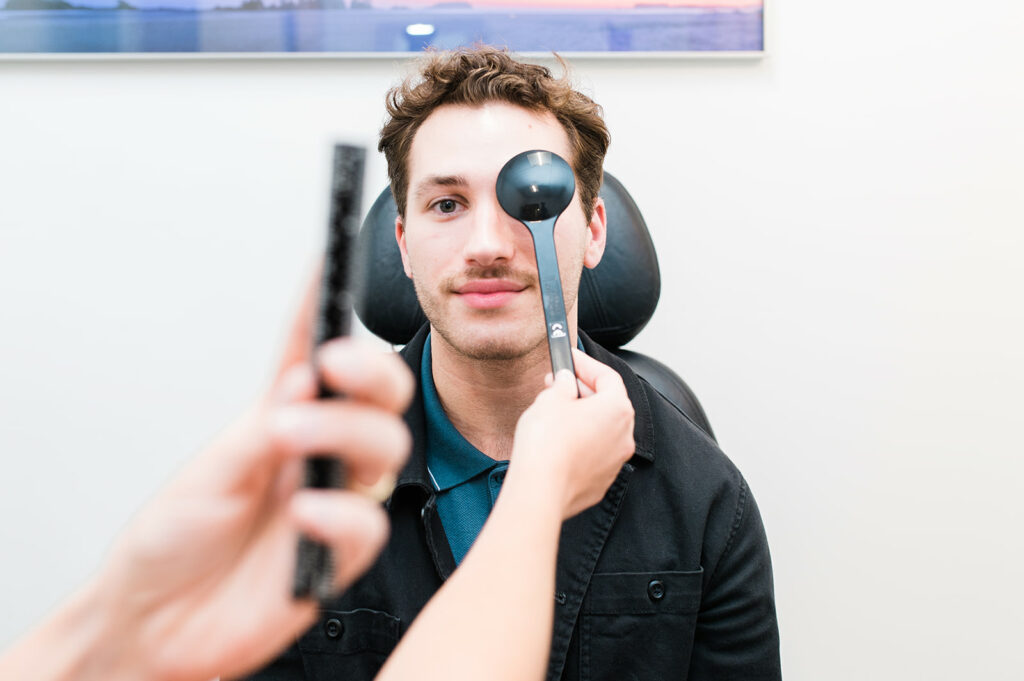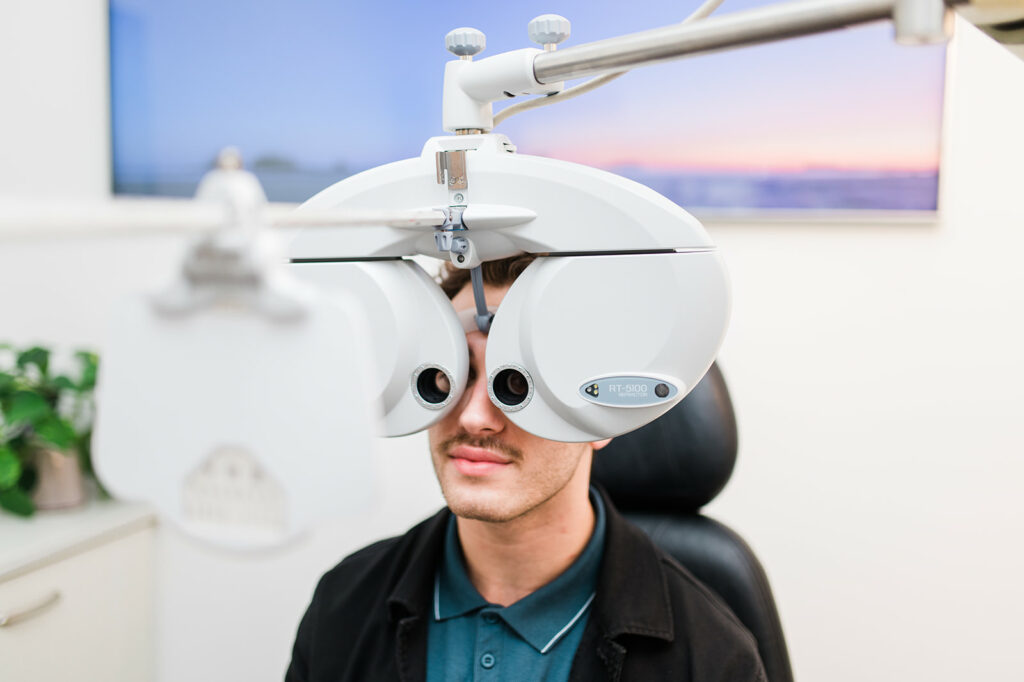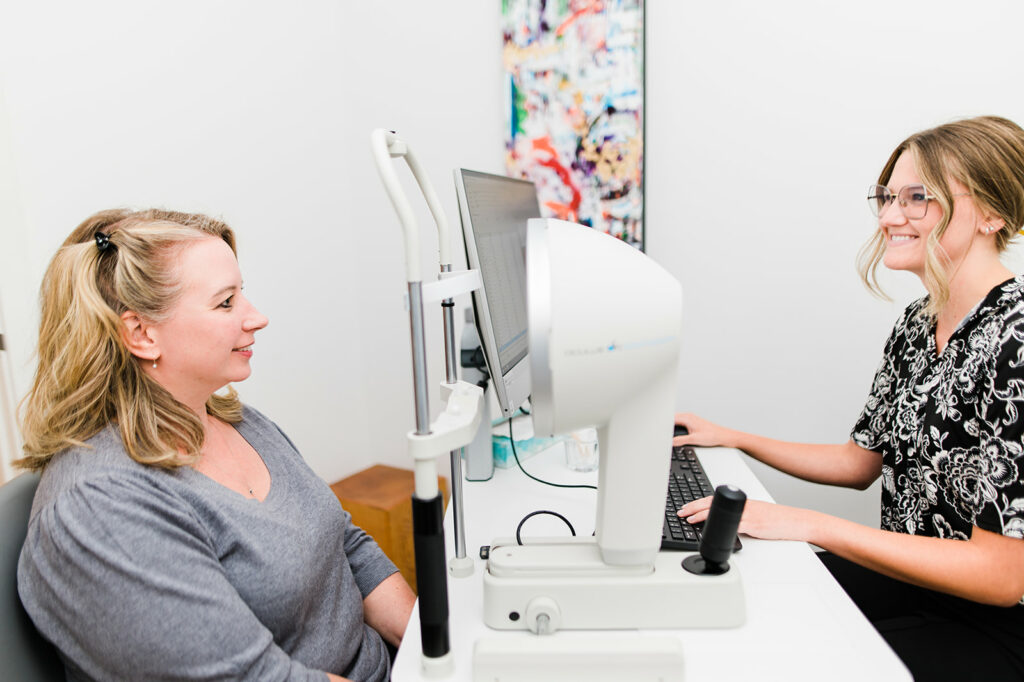When was the last time you had an eye test? Regular eye exams are essential for maintaining optimal health and catching potential issues early—yet it’s easy to let pencilling this into your schedule fall by the wayside.
If you’re wondering whether you’re overdue for an eye checkup or not, there are some signs that indicate it’s time to get one. In this blog, we’re exploring 6 signs you need an eye exam–-and why you shouldn’t wait when they pop up.
Ready to book in for an eye test in Kamloops? Book your full eye exam online today. We look forward to seeing you inside our clinic!

What is an Eye Test?
An eye test, also known as an eye exam or vision test, is an evaluation of your vision and overall eye health. The purpose of an eye exam is to assess the clarity of vision, detect potential eye disorders, and evaluate the overall health of the eyes.
At Nicola Eye Care, these are conducted by an Optometrist or Optometric Assistant. During your exam, our team will perform a series of tests to determine various aspects of your vision and eye health, including:
- Personal Assessment: This assessment is designed to gather information about your general health, family history of eye conditions, and any specific symptoms you might be experiencing; helping our team understand your overall eye health better.
- Visual Acuity Test: If you’ve ever been inside an eye clinic, you’re probably familiar with this test, which measures how well you can see at various distances. It usually involves reading letters or symbols from an eye chart.
- Refraction Eye Test: This test determines the exact prescription for corrective lenses (glasses or contact lenses) if needed. While you look through a device called a phoropter, your eye care professional uses different lenses to find the combination that provides the clearest vision.
- Eye Muscle Coordination Test: This test assesses how well your eye muscles work together. It is crucial for binocular vision, which allows both eyes to work together effectively.
- Peripheral Vision Test: Also known as visual field testing, this assesses your side (peripheral) vision. It helps detect conditions that affect the outer areas of your visual field, such as glaucoma.
- Intraocular Pressure Measurement: This test measures the pressure inside your eyes and is important for detecting glaucoma, a condition associated with elevated intraocular pressure.
- Slit Lamp Examination: This microscope-like instrument allows the eye care professional to examine the front and back parts of your eyes in detail. It is particularly useful for detecting conditions such as cataracts, macular degeneration, and diabetic retinopathy.
- Dilation: In some cases, the eye care professional may administer eye drops to dilate (widen) the pupils. Dilated pupils allow for a more thorough examination of the retina, optic nerve, and blood vessels in the back of the eyes.
- Oculus Keratography: Keratography is a diagnostic imaging technique used to assess the cornea, which is the transparent front part of the eye covering the iris and the pupil. It is used to study the shape, curvature, and regularity of the cornea’s surface. This information is crucial in evaluating conditions such as astigmatism, keratoconus, and other corneal irregularities.
- Meibography: This diagnostic imaging technique used to visualize the meibomian glands. These glands are responsible for producing the oily part of the tear film that prevents tears from evaporating too quickly. We assess the structure and function of these glands, particularly in conditions like meibomian gland dysfunction (MGD) or dry eye syndrome, as well as measure tear breakup time.
- Retinal imaging with Optomap: Optomap is a brand of retinal imaging technology that provides a wide-field view of the retina, enabling early detection and monitoring of eye conditions. It’s a valuable tool for eye care professionals in providing high-quality eye care and maintaining ocular health.
- Color Vision Testing: Ishihara color vision tests are a type of screening method commonly used to assess color vision deficiencies, particularly red-green color blindness. These tests use a series of plates, each containing a pattern of colored dots, numbers, or shapes that are designed to be discernible by individuals with normal color vision but challenging for those with specific types of color vision deficiencies.
During your eye test, our eye care professionals will do their utmost to communicate with you and keep you comfortable. At Nicole Eye Care, we offer eye testing for the whole family, so you can stop in and see us for our adult eye exams, kids eye exams, and senior eye exams. We also offer diabetic eye exams.
How often should you get an eye exam?
Generally, we recommend adults come in for a comprehensive eye exam at least every two years, or more frequently if you have unique individual needs or risk factors.

6 Signs You Need an Eye Exam
Should you be booking your next eye appointment? If you’re noticing one or more of these five signs, your answer is yes. Regular eye checkups are important for maintaining your eye health long term.
While the results of your eye exam can show you if you’re a candidate for eyeglasses or contact lenses, they can also reveal more potentially serious problems—ones you’ll want to address sooner rather than later.
Blurred Vision
Feeling fuzzy? One of the most common signs that you might want a vision test is blurred vision. If you find it difficult to read signs, books, or screens, and things appear hazy or out of focus, it’s time to come see us. Blurred vision could be a result of refractive errors like nearsightedness, farsightedness, or astigmatism; all of which can be corrected with prescription glasses or contact lenses.
Frequent Headaches
Do you experience headaches after reading, using electronic devices, or doing close-up work? Eyestrain caused by uncorrected vision problems can lead to headaches. When your eyes work harder than they should to focus, it can result in discomfort and pain, often radiating to your head. An eye checkup can identify the cause and help alleviate these symptoms.
Difficulty Seeing at Night
If you find it challenging to see clearly in low-light conditions or at night, it might be a sign of a vision problem such as night blindness or cataracts. Night blindness makes it difficult to see in dim light, while cataracts cause clouding of the eye’s lens, affecting vision, especially at night. Both conditions can be diagnosed during an eye exam, and appropriate measures can be taken to manage them.

Squinting and Eye Fatigue
Constantly squinting to see clearly or experiencing eye fatigue, especially after activities that require visual concentration, can indicate an underlying issue. While squinting is a natural response to try and improve focus, it can be a sign that your eyes need corrective lenses. Eye fatigue, accompanied by symptoms like burning or itching, can be due to dry eyes, digital eye strain, or other eye conditions. An eye test can align you with the proper treatment.
Changes in Color Perception
Any noticeable changes in your ability to perceive colors should not be ignored. Color vision deficiencies, also known as color blindness, can occur due to genetic factors or underlying health conditions. If you find it difficult to distinguish between certain colors or if colors appear faded or washed out, it’s crucial to consult an eye care professional. While there is no cure for color blindness, an eye exam is the first step to finding guidance on managing the condition.
Flashes of Light and Floaters
Floaters and/or flashes of light in your vision are indicative of various eye conditions, so if you are experiencing these it is crucial to see an optometrist for a comprehensive eye examination as soon as possible. While we can’t be sure until you’ve been examined by a member of our team, you could be experiencing a retinal tear or detachment, vitreous detachment, uveitis, ocular migraine, or other urgent eye condition.

Make Your Eye Health a Priority
If you are experiencing any of the signs mentioned in this blog, consider this your sign to schedule an eye test ASAP. Remember: Regular eye exams are essential, even if you don’t currently wear glasses or experience noticeable vision problems. By detecting and addressing issues early through routine eye exams, it’s possible not only to maintain good eye health, but also potentially prevent underlying issues from worsening over time.
Ready to save your spot? Come visit our Kamloops eye clinic for your next exam and book your eye appointment online today.